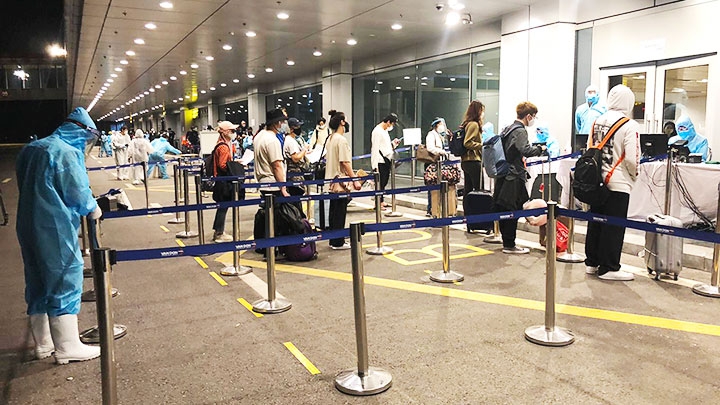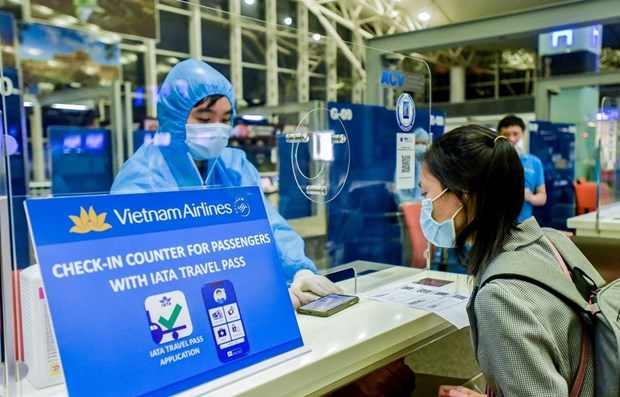Several domestic airlines in Vietnam have successfully piloted the electronic health passport for international passengers, which has formed a basis for the Government to consider officially recognising this mechanism, thus creating momentum to reopen the door to foreign tourists.

Travellers line up for procedures at an airport before entering Vietnam.
Digital health passport solutions have laid the foundation for many countries around the world to reopen and promote trade in the context of the complicated developments of COVID-19 pandemic.
In Vietnam, from June, the International Air Transport Association (IATA) and Vietnam Airlines inked a cooperation agreement on the pilot launch of an ‘electronic health passport’ (IATA Travel Pass).
Budget carrier Vietjet has also participated in trialling the IATA Travel Pass while Bamboo Airways is set to begin preparations to trial the IATA Travel Pass on international flights in the fourth quarter of this year.
The is preparing for a pilot plan on welcoming to its Phu Quoc resort island for six months from October in a bid to revive its tourism industry.
According to a draft pilot scheme developed by the Ministry of Culture, Sports and Tourism, the resort island of Phu Quoc in the Mekong Delta province of Kien Giang is scheduled to welcome international tourists with vaccine passports from October this year.
The ministry has also worked with detailed guidance on entry and quarantine for international tourists using vaccine passports as well as instructions for medical regulations, procedures to welcome and serve tourists at accommodation establishments, tourist attractions, and plans for handling medical incidents.
Preparations for the draft scheme have been hastened at Phu Quoc International Airport, where 98.7% of staff has been vaccinated against COVID-19 and 92.6% of them have received their two full shots.
The airport has been fully equipped with medical equipment for COVID-19 prevention and control, and detailed scenarios have been developed in case of detecting a suspected case of COVID-19.
The airport has also worked with the city’s health centre and the Kien Giang Provincial Centre for Disease Prevention and Control (CDC) to ensure safety for passengers with vaccine passports.

At the Vietnam Airlines counter for passengers with IATA Travel Pass (Photo: VNA)
According to the Civil Aviation Authority of Vietnam, the advantage of the vaccine passport is that individuals can create and store their health records safely and privately with a health app on their smartphones. Extracting data in the form of a QR code to provide information to the competent authority is also a superior measure to quickly verify the information, thus creating favourable conditions for passengers to travel with vaccine passports.
However, mutual recognition as well as system links between countries are needed in order to widely deploy the vaccine passport solution.
Vietnam currently has no legal regulations relating to the implementation of vaccine passports in the country, the CAAV said, emphasising the need to carry out relevant agreements at governmental and inter-ministry levels between Vietnam and other countries that will apply to international visitors entering or leaving Vietnam.
Vo Huy Cuong, Deputy Director of the Civil Aviation Authority of Vietnam (CAAV), said that the establishment of a common recognition system between countries will make it more convenient not only for passengers to travel across borders but also for functional authorities to ensure pandemic prevention and control.
From now until September 30, if the number of infections in the community is reduced, social distancing is eliminated, and vaccination rates have increased, Vietnam will be able to gradually resume domestic flights. Then, once the vaccine passport is in place, international flights can be gradually resumed.
Vaccine passports are the key to reopening, but the solution needs thoroughly research with the establishment of agency in charge of passport vaccine deployment in order to ensure privacy and anti-forgery for holders, he stressed.